Lecture- Research on Nonlinear Frequency Modulated Component Decomposition Theory and Its Application in Mechanical Fault Diagnosis
Campus A, State Key Laboratory of Mechanical Transmission-219
2019 Jun.27, 3:30 pm
Research on Nonlinear Frequency Modulated Component Decomposition Theory and Its Application in Mechanical Fault Diagnosis
 Title:Research on Nonlinear Frequency Modulated Component Decomposition Theory and Its Application in Mechanical Fault Diagnosis
Title:Research on Nonlinear Frequency Modulated Component Decomposition Theory and Its Application in Mechanical Fault Diagnosis
Time:3:30 pm, Jun.27, 2019
Place:Campus A, State Key Laboratory of Mechanical Transmission-219
Speaker:Zhike Peng
Host:Ming K. Lim, Professor, Dean
Biography
Professor Zhike Peng, received his bachelor's degree, Master's degree, and doctoral degree (1998,2002)from Tsinghua University. He is the winner of the National Science Foundation for Distinguished Young Scholars (2011), Distinguished Professor of "Cheungkong Scholars" of the Ministry of Education (2015), and "Young and Middle-aged Scientific and Technological Innovation Leading Talents" of the Ministry of Science and Technology (2016). From April 2003 to March 2009, he worked as a postdoctoral researcher at the City University of Hong Kong, Cranfield University, Sheffield University, and Loughborough University in the UK. Since 2009, he has worked as a postdoctoral researcher at the City University of Hong Kong, Cranfield University, and Loughborough University in the UK. He is the Special Researcher and Distinguished Professor of Shanghai Jiao Tong University. Now he is Deputy Dean of the School of Mechanical and Power Engineering and Deputy Director of the State Key Laboratory of Mechanical Systems and Vibration, Shanghai Jiao Tong University.
In recent years, research has focused on dynamics analysis, vibration control and isolation, and health monitoring, etc., including 1) modeling and analysis of nonlinear systems;2) Vibration suppression and isolation theory; 3) Quantitative diagnosis of structural damage; 4) Some innovative achievements have been made in non-stationary signal analysis and other aspects. He has published more than 150 SCI-indexed papers (39 as the first author) and has been cited by SCI more than 3000 times. Four papers have been listed in the TOP 1% of ESI cited papers in this field in the past decade. From 2014 to 2018, he has been selected into Elsevier's "China's Most Cited Scholars List".
Abstract
Based on the assumption of signal stationarity, the Fourier transform builds a bridge between the time domain and the frequency domain. The spectrum obtained by Fourier transform reflects the global frequency information of the signal, but it cannot reveal the temporal local characteristics of the spectrum. However, the nature and the engineering application of common non-stationary signal has the characteristics of the frequency change over time, and the essence of the Fourier transform of the signal is decomposed into a set of frequency is the same trigonometric functions, so for non-stationary signal frequency changes over time, Fourier transform cannot accurately depict this time-varying frequency patterns. The analysis of non-stationary signals, mainly divided into two categories: time-frequency analysis method and signal decomposition method. Commonly used time-frequency analysis methods include short-time Fourier transform, wavelet transform, and Wegener Weill distribution, etc., but these methods generally have problems of concentration and cross term. Typical signal decomposition methods include empirical mode decomposition, but this method is sensitive to noise and lacks the clear physical meaning of decomposition results. To more effectively analyze the non-stationary signal, the development of the parametric time-frequency transform method and nonlinear frequency modulation components decomposition, applied to include the rubbing fault, bearing and gear failure, vibration signal analysis. The Times characteristics and wave frequency component in the connection between the frequency modulation characteristics, has obtained a good effect.